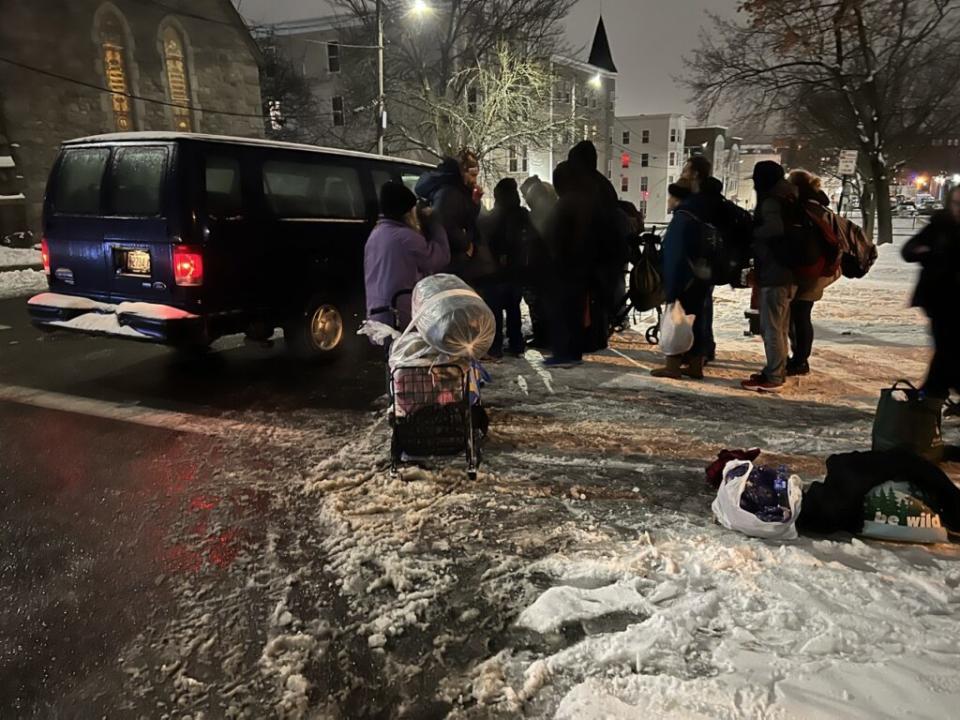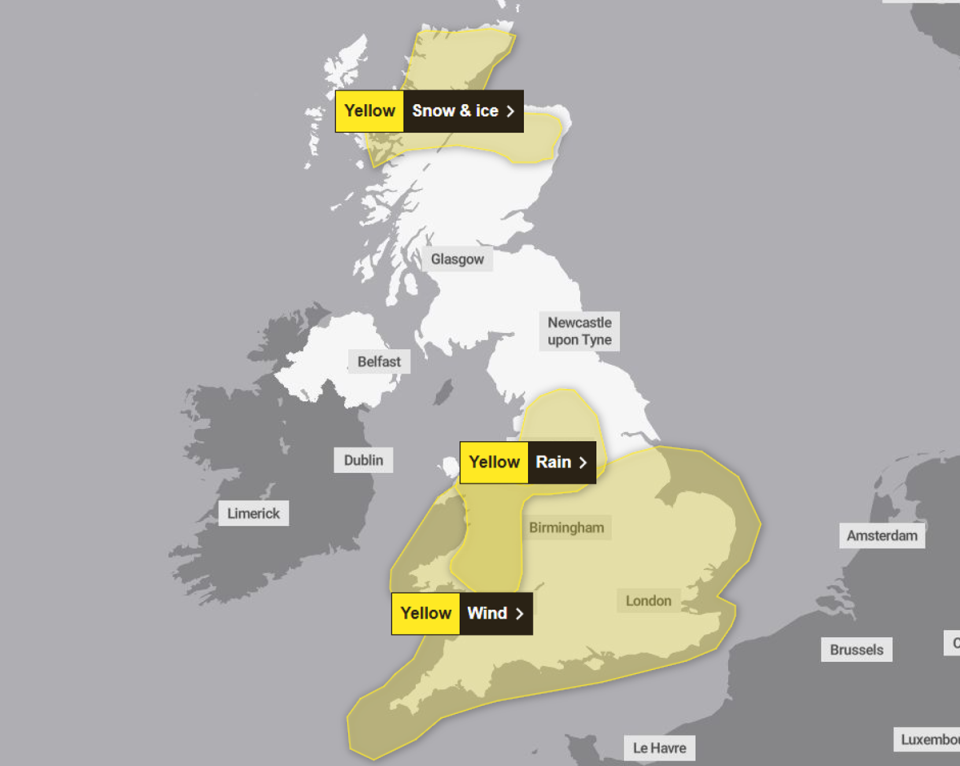Kevin Boilard, who runs Kaydenz Kitchen, sets up coffee at the nonprofit’s overnight warming center in downtown Lewiston on Dec. 10, 2024. (Photo by Eesha Pendharkar/ Maine Morning Star)
After the doors of the downtown library in Lewiston closed for the evening, roughly two dozen people trudged several blocks through Kennedy Park in ankle-deep snow to wait for a ride to the only overnight warming center in Maine’s second-largest city.
After the group waited 40 minutes, a black van arrived to make the first of many trips to the warming center, letting older and injured people board first.
Advertisement
Advertisement
The warming center is operated by nonprofit Kaydenz Kitchen out of the former home of Schemengees Bar and Grille, one of the sites of the October 2023 Lewiston mass shooting. The nonprofit previously operated out of the Calvary United Methodist Church, but with support from the community and city leaders, expanded the warming center in November.

Unhoused residents wait in Lewiston’s Kennedy Park for transportation to the overnight warming center, run by nonprofit Kaydenz Kitchen. (Photo by Eesha Pendharkar/ Maine Morning Star)
“Without this, we would be right back where we were; laying on cold sidewalk or cold grass,” said Floyd Young, one of many people who frequently comes to the warming center.
The center provides a respite for Lewiston’s unhoused population from the harsh winter nights. But even with a place to shelter, this and other services can only provide a patchwork of solutions since the city still lacks a permanent low-barrier shelter.
Before the van arrives, Kaydenz Kitchen employees and volunteers set up hot coffee, food and snacks behind the bar.
Advertisement
Advertisement
As the first group of people entered the center, Tonya Sands greeted some of the familiar faces.
Sands — who also works at Trinity Jubilee Center in Lewiston, which offers food and shelter from 7:30 a.m. until 3 p.m six days a week — explains that even with such services, the lack of permanency for the city’s unhoused residents can be grueling.
“People are not allowed to sleep [at Trinity Jubilee Center] because we’re not a shelter, we’re a day center. And then here, it’s a lot of the same guests and they’re not allowed to sleep overnight because we’re a warming center,” Sands said. “So realistically, homeless people are expected to stay awake 24/7.”
For the hours in between, unhoused people either find a gas station, alcove, or head to the public library. Then they return to Kennedy Park to be driven to the warming center after the library closes.
Advertisement
Advertisement
More in U.S.
The Schemengees sign remains on the wall, but the warming center has been transformed into a rec room of sorts. Tables and chairs are set up with board games; there is also a TV and couch with a Nintendo PlayStation. And for the 12 hours the center is open, guests can put their belongings in cubbies. Community members have contributed kitchen appliances, and local grocery stores, schools and businesses often donate food. Target provided a Christmas tree this year, and warming center staff sourced gift bags, stockings and presents for unhoused community members, many of whom have spent the holiday season outside.
“Merry Christmas … now get back in the cold. That’s obviously not how the conversation actually goes but that’s exactly how it feels,” read Kaydenz Kitchen’s Facebook post from December 25..“Dropping 40 plus people off in the park on Christmas morning, knowing we are going back home to warmth and family, is a tough reality to be part of. All we want for Christmas is a 24/7 shelter.”
Kaydenz Kitchen recently received $2.5 million from MaineHousing to build the city’s first low-barrier homeless shelter, after years of municipal opposition. Once that project is complete, staff will be able to provide many services they currently can’t, such as beds, case managers for housing assistance, and access to nurses for basic first aid, Sands said.
In April 2022, Lewiston imposed a six-month moratorium on new shelter construction.

Linda Chagnon, one of the guests at Lewiston’s new overnight warming center. (Photo by Eesha Pendharkar/Maine Morning Star)
“One of their arguments was ‘if you build it, they will come,’ so they were concerned that if we just open up more shelters, we just attract more people here to use them,” said city council member Scott Harriman, who has served in that post since 2021. “But we have a lot of people here already, local residents who need shelter.”
Advertisement
Advertisement
But with new leadership on the council, the city has come around. Even so, there are still barriers, including zoning laws, and a local camping ban that does not allow unhoused people to store their belongings or sleep in tents on city property. Several said that even though there isn’t currently a shelter for people to go to, police are giving out warnings.
Linda Chagnon, who was at the warming center with her husband, said in early November they were “asked to move our tent with all our stuff in it because we had it set up under a bridge and someone called the cops on us.”
After the warning, Chagnon said her family will have to move the tent if they want to keep their belongings, since taking everything with them from a day center to the public library to the warming center overnight isn’t possible.
Young has been working with social workers to find housing, or space in a nursing home, so he can attend to his much-needed hip surgery. But he said he is frustrated by the lack of progress, and continues using the warming center to stay out of the cold.
Advertisement
Advertisement
“It was better 15 years ago. It was easier to get an apartment, there was less red tape,” he said.
SUPPORT: YOU MAKE OUR WORK POSSIBLE
EMEA Tribune is not involved in this news article, it is taken from our partners and or from the News Agencies. Copyright and Credit go to the News Agencies, email news@emeatribune.com Follow our WhatsApp verified Channel





